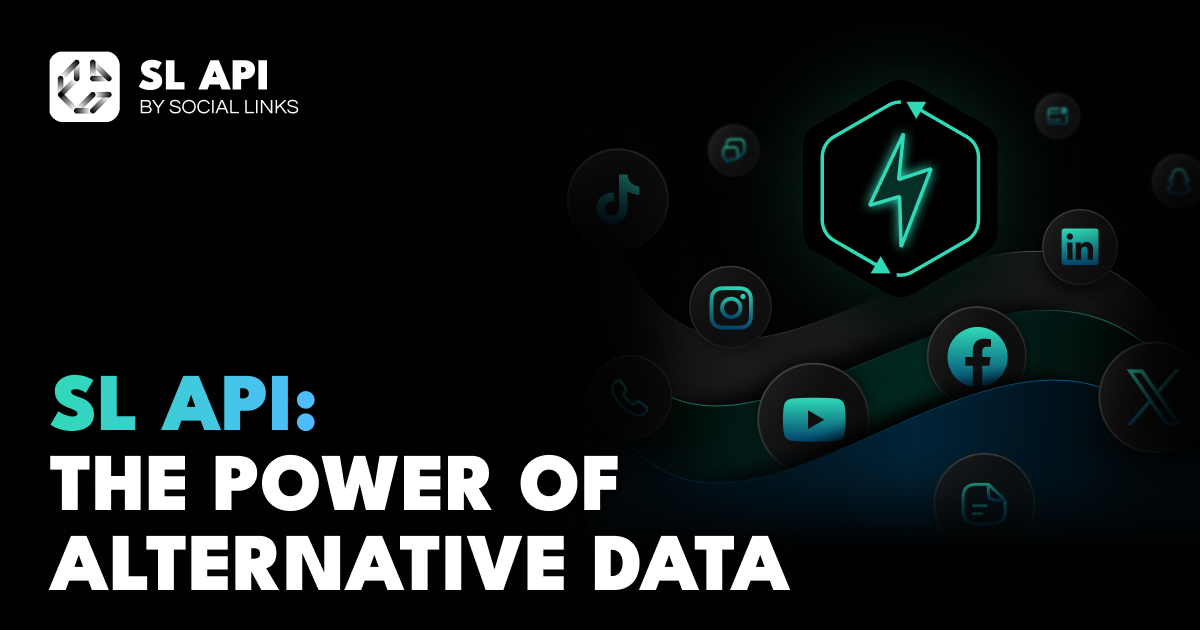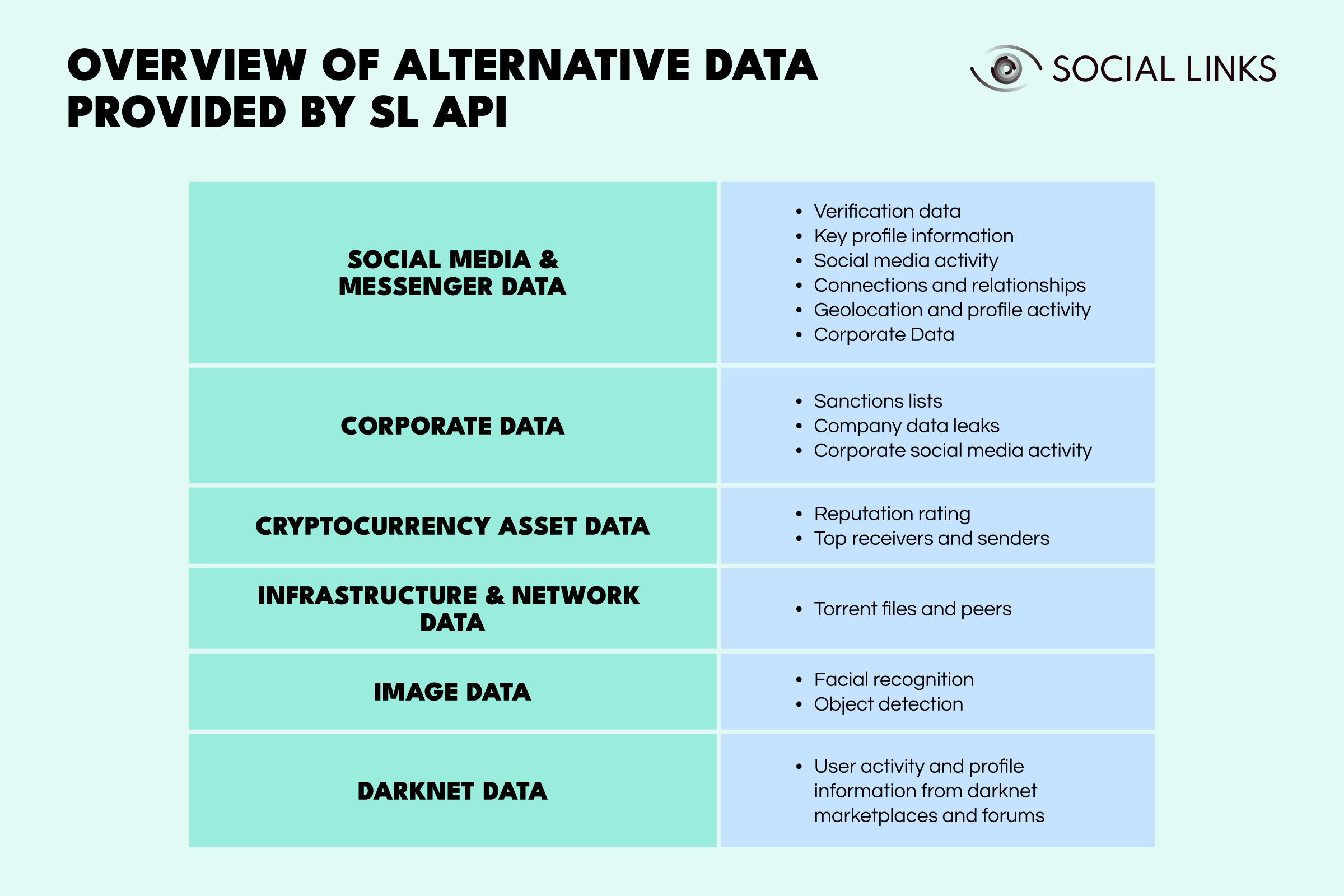SL API and the Power of Alternative Data


In today's digital landscape, the open-source data API has become an indispensable tool in helping developers, product teams, and analysts build effective, data-driven products and processes. By providing access to a wide range of data types from open sources, such APIs can simplify the development process and add value to a wide range of products.
While certain APIs are well-known and provide one type of data that is widely applied—for example, WHOIS data for enriching domain information—there are many data types out there that are comparatively overlooked, yet can greatly elevate product value. So today, we want to focus on some of these alternative kinds, and show how, through SL API, they can bring immense value to a range of established use cases.
Social media and messengers have become an integral part of modern life. So much so that networking platforms now retain the imprint of almost every sphere of human activity. And this wide variety is reflected by a range of data, which in turn, offers huge versatility of application and real value for a number of use cases.
Social Links API provides access to vast quantities of public data from both mainstream and niche social networks and messengers—this includes details of users, profiles, communities, groups, and pages, plus media published by users and more. While these data points may have a direct bearing on particular query, such information can have huge utility through less-obvious applications:
Verification Data. Information about whether a user is registered to a given messenger or social network may be necessary to test hypotheses, search for a profile, and get additional information about the user.
For example, recovery data such as a partial phone number or email address with which a given account was registered can verify an assumption about the user's credentials. Checking for corporate email addresses can also identify employees who have used corporate data to register on unauthorized platforms.
Key Profile Information. Data collected across various social networks, messengers, and other platforms to which the user has subscribed. This broader collection can be crucial when analyzing the consistency of a digital footprint, and may also be necessary for KYC, background checks, name or username enrichment.
Social Media Activity. The collected posts, threads, reviews, reactions, comments, and messages of a given user can provide vital information about your PoI interests, views, and opinions, giving a valuable insight into their behavior in the digital environment, including:
Connections and Relationships. Data on followers, followees, friends, and connections can give a revealing picture of your PoI’s interests, social circle and influence in the public sphere.
Geolocation of Profile Activity. Geolocation data such as tags and check-ins can tell you about the user's interests, connections, and even specific whereabouts at a given time, which may be essential in reconstructing events.
Corporate data collected through SL API can shed significant light on a company's structure, operations, and personnel. Such data is proven to be invaluable for companies and researchers looking to mitigate risk and make informed decisions. Aside from the more commonplace types of data such as company and employee details, SL API delivers a range of more subtle data types that set it apart from other open APIs on the market:
Sanctions Lists. Data regarding any sanctions imposed on individuals, legal entities, or organizations can improve the quality of operational risk analysis (due diligence and KYC) associated with entering into business with a given customer, supplier, or partner.
Company Data Leaks. Leaked information about organization founders and their affiliations can improve the quality of KYB procedure and also reveal hidden or suspicious ties between different entities and individuals.
Business Social Media Activity. Social media profile data relating to a given legal entity can deliver more thoroughgoing due diligence, KYC, and KYB procedures and facilitate lead generation.
In today's financial landscape, crypto has become something of a double-edged sword. While on the one hand it offers innovative solutions for global transactions, its decentralized and anonymous nature has also made it a tool for criminal activities such as money laundering, fraud, ransom payments, and illicit trade. While transaction and transfer information are staples of blockchain enquiries, SL API also opens the door to data types that are less common yet can be of critical value:
Reputation Rating. Reputation ratings assess the trustworthiness of a given cryptocurrency wallet or address based on their transaction history and whether there are any associations with known illicit activity. Such ratings can help to quickly assess the nature of a wallet owner's activities on the blockchain network.
Top Recievers and Senders. This data relates to the most active wallets or addresses in terms of cryptocurrency sent and received—it identifies the key participants in the flow of funds in a given blockchain system as they relate to the wallet owner. This provides insights into a range of connections and their nature.
Infrastructure and network data gives valuable insights into the digital landscape, helping organizations identify vulnerabilities, monitor threats, and protect their assets. SL API not only provides useful standard data such as WHOIS history, open port information, DNS and host information, domains, subdomains and related domains, it also delivers more niche information that may be paramount for conducting truly reliable threat intelligence.
Torrent Files and Peers: This data includes information about torrent files, associated metadata, and file-sharing participants. Torrent data may not only indicate the unauthorized distribution of sensitive or proprietary information (leaked documents, intellectual property, etc.) but also the interests and affiliations of the user whose IP address is being examined.

Images are a form of data which can be crucial in a range of applications, yet are often overlooked as an information resource. SL API allows you to deploy advanced alternative extraction methods such as facial recognition (via social network profiles search), reverse image search, and object recognition in photos. This not only expands the range of search vectors at your disposal, it also speeds up the overall investigation process.
Facial Recognition. This allows you to identify, link, and map all social media accounts belonging to a specific individual across various platforms. By analyzing profile pictures and other publicly available images, investigators can map a PoI’s entire online presence.
Object Detection. This advanced AI-driven feature allows you to quickly scan a huge quantity of images from social media and other platforms to find particular objects, scenes, or details that may be crucial to reaching your goals.
Reverse Image Search. Another AI-powered tool, this feature enables you to trace the origin or duplicates of a particular image, wherever they may be scattered across the online environment.
The Dark Web continues to be a not-so-popular source for deploying automated data collection, and yet for many fields—especially criminal investigation—it’s profoundly important, offering an array of information that simply cannot be found anywhere else, and can be applied to great effect in a variety of applications. SL API can provide this crucial data, including:
Profile Data. Information about users and sellers operating on darknet forums and marketplaces, including name, alias, email addresses and domains, phone numbers, cryptocurrency wallets, products sold, etc.
User Activity. Posts, comments, threads, product listings, and other user actions relating to darknet forums and marketplaces. This data can reflect a PoI’s activity, behavior, and connections, which are often invaluable in criminal investigations.
Open-source data comes in a vast variety of forms. While particular APIs may have gained popularity for delivering particular data types for particular staple purposes, the truth is that it’s mainly by harnessing the full palette of data types out there, that developers and analysts can create ever more powerful products and effective processes.
With its full-spectrum range of open-source data, SL API is an all-in-one solution that provides the variety and integration of data required to deliver a new level of value in your data applications.
If you'd like to learn more about how SL API can streamline your products and processes, click the button below and arrange a free, personalized demo with one of our specialists.